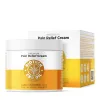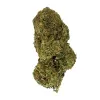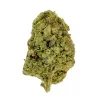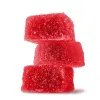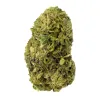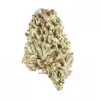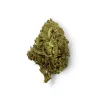With so many new cannabinoids available on the market today, there is no doubt that consumers have many choices — and many questions, the first among them being “what is HHC?” But before getting into a long discussion about HHC, it’s essential to take a moment to talk about the 2018 Farm Bill. While it’s rare that Congress does anything forward-thinking these days, the Farm Bill passed into law a few years ago changed the game for all cannabinoids, including HHC. Without that law, consumers wouldn’t have access to such new and innovative products. What Congress accomplished when they legalized hemp in 2018 is nothing short of a miracle.
Thanks to the 2018 Farm Bill, many new cannabinoids have hit the market over the past couple of years. In just under four years, the sector has introduced us to Delta-8 THC, Delta-10 THC, THCP, and so much more. These days consumers looking for a new experience can feel buzzed, focused, relaxed, and calm — and best of all, they can do it legally. There’s a healthy debate in many states right now about the legality of many of these compounds, and many state legislators continue to fearmonger. Still, for the most part, when it comes to the world of hemp, combinations like HHC are winning.
And it feels so good.
What Is HHC?
There was a time just a few years ago when advocates were clamoring for the right to enjoy CBD while wondering which state would be the next to legalize cannabis. Now, hemp has moved light years ahead of cannabis thanks to Congress and some good old-fashioned American innovation. It is innovation at its finest.
And the latest cannabinoid we have to be thankful for is HHC or hexahydrocannabinol. But what is HHC? Well, believe it or not, HHC isn’t as new as some may think. It’s an older cannabinoid that was discovered in the 1940s. According to research and anecdotal evidence, it gives users a very potent high, more substantial than delta 8 but not as bold as delta 9 THC. HHC sits nicely in between the two and still packs some punch. Moreover, HHC is now coming to the consumer marketplace and making some waves.
As with all new cannabinoids, it’s best to be educated before diving in head first.
“HHC was first created in 1944 by the American chemist Roger Adams, when he added hydrogen molecules to Delta-9 THC. This process, known as hydrogenation, converts THC to hexahydrocannabinol (HHC),” writes Leafly. “Hydrogenation isn’t limited to cannabinoid production. A similar process is used to convert vegetable oil to margarine.”
“While Adams created HHC from conventional cannabis-derived THC, these days the cannabinoid is typically derived through a process that begins with hemp, the low-THC cannabis plant that was made federally legal by Congress in the 2018 farm bill,” Leafly continues.
Okay, so that’s the science of it all. But that is only the beginning of this new and exciting hemp-derived compound. What are the benefits of HHC? How is HHC manufactured? And, most importantly, does HHC get you high? As with all new cannabinoids, it’s essential to know these things.
Want more answers to the question “what is HHC?” Perhaps most importantly, is HH safe and legal? Well then, keep reading.
Benefits of HHC
Believe it or not, there is more than one type of HHC. In fact, according to science, there are 10 very distinct breeds of HHC. As one group tells us, “it has no double bonds in its structure. HHC is the opposite of CBN (cannabinol). At the molecular level, all the double bonds are broken and then filled in (on the molecule chain) with hydrogen.”
So how do you tell the difference between the different THC and HHC? From a scientific point of view, it’s all about the double bonds - of which HHC has none. Take a look at the chart below:
|
Compound |
Bond |
Location |
|---|---|---|
|
Delta 8 |
Double |
8th Carbon |
|
Delta 9 |
Double |
9th Carbon |
|
Delta 10 |
Double |
10th Carbon |
|
HHC |
None |
N/A |
But that’s for the folks in the white lab coats. How does this translate into benefits? In other words, what are the benefits of HHC?
Like CBD and Delta 8 THC before it, HHC has several other benefits. According to researchers, HHC can help users look for several different uses. Many note that compared to most other cannabinoids, HHC is most similar to Delta 9 THC both in terms of the high it offers and its wellness properties. Both compounds have a similar chemical structure, so whether users are looking for a buzz, pain relief, or relaxation, HHC is as close to delta 9 as one can get on the legal market.
There is more than anecdotal evidence about HHC benefits available. According to an old study from 1977, in which HHC was tested on rats, the compound may work as a painkiller. However, rat studies rarely translate into humans. Meanwhile, another more recent study in 2007 found that HHC showed potential as a sleep aid. Research is ongoing.
Overall, researchers claim that HHC is around 80% as potent as delta 9, or what most people know as cannabis. Throughout the years, various benefits of HHC have been noted, including:
- Enhanced Sleep Quality
- Stress relief
- Feeling relaxed
- Decreased Inflammation
- Head and Body High
Before anyone uses any cannabinoid, they must know whether it is safe. So, as can be seen, the benefits of HHC are many. It compares favorably to Delta 9 THC in terms of its wellness properties and the high it offers users. But just because it gives people a buzz and has several benefits doesn’t mean it’s the ideal compound for everyone.
Potential Side Effects Of HHC
We know that HHC is safe to consume even though we don’t have as much information about it as Delta 9 THC and CBD. However, we know that, much like those two cannabinoids, HHC has no known harsh side effects. Much like Delta 8 THC and cannabis, HHC should always be taken in moderation, and users should always know their limits, but it is otherwise safe to use.
Still, it is essential to note that like other cannabinoids that have grown in popularity since the passage of the Farm Bill, HHC comes without comprehensive studies into its safety or effects. Much of what is known about it is speculative. According to preliminary research, HHC has a similar safety profile to THC and reported side effects are similar to those associated with high doses of THC.
What does that mean? HHC may cause some side effects such as:
- Feeling anxious
- Mouth dryness
- Feeling dizzy
- Hunger
- Paranoia
- Restlessness
- Sleeplessness
- Insomnia
- Rapid heart rate
- Red eyes
As with all cannabinoids, always take HHC in moderation.

How Is HHC Manufactured?
As mentioned above, HHC or hexahydrocannabinol isn’t precisely a new cannabinoid. It was first synthesized way back in the 1940s, although, like Delta 8 THC, it does occur naturally in the hemp plant. It’s just that, like Delta 8 THC, it isn’t found in large quantities. But that also doesn’t mean that HHC is a synthetic cannabinoid. It very much still comes from hemp.
Much like Delta 8 THC, HHC is made from a hemp foundation. There are many steps involved in the process. In the first place, CBD is extracted from raw hemp, distilled, and then isolated as a powder from the hemp roots. Things get a little more complicated from there on out.
A report describes the manufacturing process of HHC as a proprietary process that takes place inside a chemical reactor. Most companies refer to their manufacturing process as "proprietary." CBD goes in one end, and HHC comes out the other.
But there are other ways of creating HHC too. One can hydrogenate THC — To hydrogenate THC, concentrated THC must be exposed to hydrogen, high pressure, and either palladium, platinum, or nickel as a metal catalyst. After the catalyst has completed its task, it is removed from the mixture so it can no longer be used. And a few years ago, one study proposed using gastric juice to make HHC.
Does HHC Get You High?
What is HHC, and, perhaps most importantly, does HHC get you high? In other words, what are the effects of this tremendous new cannabinoid? What does it feel like to vape HHC or take some in edible form? And how does HHC affect the body’s chemical processes?
Some experts argue that HHC produces the same effects as delta 8 THC, but it takes much more compound to make the same results. But those folks are in the minority, as most will note that HHC is much stronger than delta 8. According to those who have used it, HHC’s effects are very similar to THC. When using HHC, one may feel:
- Euphoria
- Altered auditory perception
- Altered visual perception
- Altered cognition
As for feeling relaxed, HHC feels very similar to delta 8. On the other hand, some users claim that they feel energetic and can think more clearly after using it.
HHC causes users to feel buzzed or high — more so than delta 8 but less than delta 9. So, with HHC, users typically have a potent or Delta 8 THC-like effect. That makes this an excellent cannabinoid for those looking for something substantial but not too strong — small doses that don’t overwhelm your senses. But even more than that, HHC can be used by those looking for more than just a buzz.
Although HHC will cause intoxication, the level of intoxication will be far less than delta-9 THC, which can be found in marijuana.
What Does HHC Feel Like?
So what does HHC feel like? Most users compare it to Delta 8 THC. Still, some also say it is a lot like good old-fashioned cannabis. While lots of cannabinoids have been introduced to the market over the past few years, HHC is the one that most closely resembles cannabis, according to anecdotal data. Why is that? HHC is similar to Delta 9 THC in terms of its effects.
Some argue that HHC and Delta 9 have similar chemical structures, giving users equal highs. Whatever the reason, people who try HHC can immediately recognize its effects. These effects include:
- Intense euphoria
- Mild relief from pain
- Head high
- Body high
- Being more talkative
- Happiness
- Calmness
- Relaxation
- Less anxiety
- Stress Relief
There’s a lot of information about HHC, but here’s what you need to know. It’s safe, a lot stronger than Delta 8 but less so than Delta 9 THC, and a lot of fun. Essentially, HHC can have similar effects to THC on the body and mind and is more potent than delta 8 THC on a milligram-per-milligram basis. It is generally recognized that delta 8 THC is about half as potent as the standard delta 9 THC.

How Potent Is HHC?
So, just how potent is HHC? Some conflicting reports are out there, with some so-called experts saying it is less potent than delta 8 and others noting it is a potent cannabinoid. Many early reports about HHC stated that it was a mild cannabinoid, only about half as powerful as delta 8 THC. However, it turns out that they were incorrect. The truth of the latter is that HHC is one of the more potent compounds on the legal market today.
Hexahydrocannabinol, or HHC, is a new cannabinoid of interest that has been discovered in hemp plants. It is found alongside the various other cannabinoids that consumers have come to know and love and is now available in edible and vape form almost anywhere. Even though HHC is a pretty new cannabinoid, there are still many things users do not know. Nevertheless, there are people out there who have tried it and are finding its beneficial effects and properties quite enjoyable.
Often, THC is compared to HHC, and because of this, it's essential to compare the two to properly understand what each contributes to the table when it comes to cannabis.
How potent is HHC? The truth is it has a similar potency to THC, though it is slightly milder. It is much more powerful than delta 8. This is because the HHC compound is substantially identical in structure to THC, even though it’s been modified a bit.
HHC vs. THC
How does HHC compare to THC or delta 9 THC, and how does it compare to other similar cannabinoids like delta 8 and delta 10?
To better understand the potency of THC and HHC, we need to look at their chemical structures. The body binds to THC more tightly than HHC, making it a more complex cannabinoid. There are therapeutic benefits for both THC and HHC. However, THC has been extensively studied and is widely known to be comparable to a THC high, if not stronger. Users claim that HHC has a "cleaner" high than marijuana, with no hangovers. It is estimated that THC is three times stronger than traditional marijuana and up to five times stronger than HHC. THC may take several hours to kick in, but the effects are much more intense and can last up to six hours.
On the other hand, Delta 8 THC is the cannabinoid to beat these days. It was the first all-natural, hemp-derived cannabinoid with a buzz to hit the market. The best part about Delta 8 THC is that it’s federally legal, thanks to the Farm Bill, allowing users to enjoy the buzz without interference from anyone.
But HHC is something altogether different. It’s a cannabinoid with about twice the potency of Delta 8, making it the perfect product for anyone looking for something stronger.
As for comparing HHC to Delta 10, it’s two cannabinoids in different stratospheres. Delta 10 THC is a hemp-based cannabinoid made for people who like to move and shake. It’s for those who need to keep going to get things done. People who take Delta 10 products will find themselves energized and focused, with a burst of creative energy flowing through them. It’s the opposite of HHC.
For more on how HHC compares to these cannabinoids, take a look below:
|
|
Benefits |
High |
Safety Profile |
Legality |
|---|---|---|---|---|
|
Delta 8 |
Wellness, Buzz, Relaxation |
Mild |
Extremely Safe |
Legal (May vary by state) |
|
Delta 9 |
Wellness, Buzz, Relaxation |
Strong |
Extremely Safe |
Legal (May vary by state) |
|
Delta 10 |
Energy, Focus |
Mild |
Extremely Safe |
Legal (May vary by state) |
|
HHC |
Wellness, Buzz, Relaxation |
Strong |
Extremely Safe |
Legal (May vary by state) |
HHC vs. CBD
So how does HHC compare to CBD? That’s a big question, and there are lots to go through here. The truth is, in many ways, CBD and HHC are pretty similar. That’s because both compounds bind to your CB1 and CB2 receptors in different ways. Much like Delta 8 and any other cannabinoid with which you might be familiar, CBD and HHC interact with the endocannabinoid system, the part of your body that helps maintain homeostasis.
If you’re looking for a unique cannabinoid experience, combining HHC and CBD is a great option. Anecdotally, it’s been said that if users connect these cannabinoids, they get a balanced buzz, which sounds fantastic. It’s similar to what happens when you combine Delta-8 and Delta-10; the two give you an ultimate experience that allows you to do whatever you can.
Both cannabinoids work so well together because they balance each other out. HHC and CBD work with each other to create a sort of synergy in your body, with CBD balancing out the buzz from HHC. Even though HHC has a very mild psychotropic high, it’s still high. When CBD is added to the mix, you get a unique experience that leaves you feeling clear-headed and awake.
Want to learn more about HHC vs. CBD? Take a look below:
|
|
High |
Legality |
Benefits |
Status |
Research |
|---|---|---|---|---|---|
|
HHC |
Strong |
Legal (May vary by state) |
Wellness, Buzz, Relaxation |
Minor Cannabinoid |
Little research has been done. |
|
CBD |
None |
Legal everywhere |
Wellness |
Major Cannabinoid |
Lots of research has been done. |
Will HHC Trigger A Drug Test?
Does HHC show up on a drug test? It’s a question that everyone asks about each new cannabinoid that appears on the scene. Moreover, it’s one of its most important selling points for HHC. After all, when it comes to HHC, a standard 12-panel drug test will not be able to detect it. That’s a win for everyone.
Many alternative forms of THC, such as delta 8 THC and delta 10 THC, will appear on urine or blood tests for THC if they consume enough of them in sufficient amounts. But HHC does not.
Although, at this time, the evidence supporting this claim is mainly anecdotal, preliminary research suggests that HHC doesn't metabolize into 11-hydroxy-THC. This primary THC metabolite may cause a positive test result to appear.
Still, it’s always best to abstain from using anything before a drug test, as nothing is guaranteed.

Is HHC Legal?
Ah, yes, our favorite question and one that arrives with introducing every new cannabinoid. Is HHC legal? Well, thanks to the Farm Bill and our friends in Congress, the answer to that is a resounding yes — with the caveat that it might lie in a grey area and that there’s always a bit of disagreement on this one. But, for the most part, it’s hard to argue that it is not.
So let’s call it a legal gray area; however, the truth is a bit simpler. According to Leafly: “[One] company’s website argues that since HHC is hemp-derived, and not actually THC, they should be in the clear. ‘HHC vapes, gummies, or edibles are perfectly legal on the federal level and will most likely remain legal on the state level as well,’ the website reads.”
“Company officials additionally argue that since HHC is found in the seeds and pollen of hemp plants, it is “non-synthetic” and thus a ‘perfectly federally legal hemp extraction,’” writes Leafly.
But, to be clear, HHC’s legality depends on how one interprets the law.
As part of the 2018 Farm Bill, the Drug Enforcement Administration (DEA) issued an interim rule clarifying the regulatory controls over cannabis and its constituents. "All synthetically derived tetrahydrocannabinols are still Schedule I controlled substances," it stated.
As a result, HHC's legality is primarily determined by whether it is a natural or synthetic substance. Most would argue, and rightfully so, that it is genuine.
Confusing, right? That’s the law for you. But anyway, for now, HHC is legal to make, purchase and consume, so as the old saying goes, get it while it’s hot.
Still, some disagree. As Leafly wrote: “Other experts are more skeptical. James Stephens, the cannabinoids scientist at Creo, believes HHC is subject to the Federal Analogue Act, which states that any substance analogous to a Schedule I drug—in this case, conventional THC—would itself qualify as a Schedule I drug. Since THC remains illegal, HHC would be illegal too.”
As always, what happens remains to be seen.
What Is The Proper Dose for HHC?
Finding the proper dose of HHC can be difficult. Doing so depends significantly on the individual and their tolerance to certain cannabinoids. If a user has a high tolerance, they may wish to start with a higher dose of HHC. Conversely, those with a lower tolerance to cannabis may want to try a lower amount to start.
Remember that HHC sits between Delta 8 and Delta 9 regarding potency. With that being said, the following chart should help you find the correct dose:
|
Low Dose |
10-20mg |
|---|---|
|
Moderate Dose |
20-50mg |
|
High Dose |
50-100mg |
Can You Build Up Resistance to HHC?
You can build up a tolerance to HHC. The last thing any user wants is to purchase some HHC Gummies or vapes, only to find out that they need to take more and more of them each time to feel the buzz. Not only would that start to get boring after some time, but it would also start to cost a lot of money. HHC has changed the game thanks to its hemp-derived buzz — mainly because it is entirely legal — but the tolerance question would send everything up in smoke.
Of course, tolerance does depend on the user. For many people, HHC is something they will only use every once in a while. But if it is used as an every day product then tolerance can defintely build up. As with all cannabinoids, moderation is key.
But will you build a tolerance for HHC if you keep puffing or constantly pop some gummies? While no studies have delved into the question specifically about HHC, similar cannabinoids show you can. As one study noted, a tolerance to the cannabinoid Delta-8 THC has not been documented to date. Despite this, based on numerous user reports, it has been shown to be a similar product to Delta 9 THC. The point being, to avoid building up a tolerance, use cannabinoids in moderation.
So, tolerance can be an issue for cannabinoids, including HHC. It only happens if you use it to extreme excess. Use moderation, take some tolerance breaks, and you should be alright.
So Why Choose HHC?
People choose HHC for the same reasons they choose the various other cannabinoids. Sure, they enjoy the legal, tremendous psychotropic high, but there’s so much more. HHC, like CBD and Delta 8 THC, helps bring people together. Moreover, HHC is a safe compound.
So why should anyone choose HHC? For so many reasons:
- For a natural buzz
- For a legal high
- For a hemp-derived compound
- For an all-new cannabinoid
- For an exciting change to your everyday routine
- For yourself
HHC has so much potential, like CBD, Delta 8, and Delta 10 THC. Users will find new and exciting ways to use and enjoy this excellent compound. In the meantime, check out some HHC today and see what an all-natural buzz can do for you.

